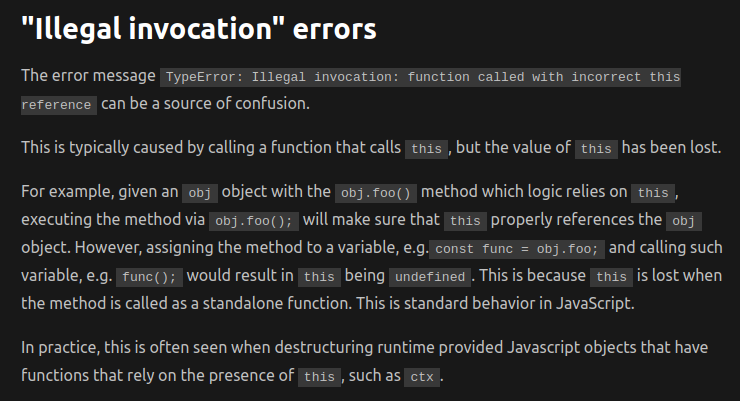Fetch this: Illegal invocation in Cloudflare Workers
21 Jan 2025
If you write anything in JavaScript, you've certainly encountered the this keyword, and wondered what is this? Even if you're an experienced JS dev, sometimes this can bite you in unexpected ways.
This happened to me today, while porting a codebase from the got library, to the builtin fetch method. I had a method to write that was doing a bunch of API calls (using fetch), massaging the data I got from one endpoint, and sending it to another.
To unit-test that method, I didn't want to do actual API calls, but rather mock the calls, and return fake data to simulate a real call exchange. My test needed to assert that one of the calls in the pipeline was using the right headers.
// main.js
export default {
async run() {
// Here I do a bunch of chained API calls
// [...]
},
__fetch: fetch
}
// __tests__/main.js
vi.spyOn(main, '__fetch').mockReturnValue({...});
Instead of using fetch directly in my run method, I added the __fetch key into my object, and would call this.__fetch instead. That, way, I could spyOn the method and mock the returned value. As main.__fetch would become a mocked function, I could also run asserts on it to check if it had been called enough times and with the right number of arguments.
That works perfectly and my tests all pass \o/
But it fails in production
Weirdly enough, even if tests are passing, the code doesn't actually work in production once deployed to Cloudflare workers. What I got instead was a nice TypeError: Illegal invocation: function called with incorrect this reference error.
Turns out it's a well known and documented type of error on Cloudflare Workers. Their documentation even has a dedicated part about it.

What's happening is that once the code is bundled with esbuild before being sent to Cloudflare workers, the reference to this inside of fetch is lost.
The solution
The fix is surprisingly simple. Instead of attributing __fetch as a reference to fetch, all I had to do was to define a new function that would simply call fetch.
export default {
async init() {
// Here I do a bunch of chained API calls
// [...]
},
__fetch: async function(url, options) {
return await fetch(url, options)
}
}
This creates a wrapper around fetch, so its this isn't lost.
This might look like repetitive code, but the wrapper actually has a use. I made sure to add a comment around that wrapper so future me doesn't inadvertently "optimize" the code and break it.
Want to add something ? Feel free to get in touch on Bluesky : @pixelastic.bsky.social